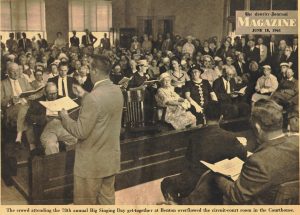
A time-honored tradition in Marshall County will be taking a slightly different approach this year.
The 134th annual Big Singing, typically held on the fourth Sunday in May, will add a second day of singing and fellowship. This year’s event will begin at 10 a.m Saturday in the Marshall County Fiscal Courtroom at 1101 Main St. in Benton.
It’s a musical landmark all its own. Participants gather to sing from “The Southern Harmony, and Musical Companion,” a 19th century songbook used to teach folk and religious singing in the southern U.S. Rather than using traditional music notes, the book uses shape notes: a four note system utilizing a triangle, circle, square and diamond to designate fa, so, la and mi, respectively.
Gene Gilliland, president of the Society for the Preservation of Southern Harmony Singing – the group that coordinates the effort each year – said that it was the book itself that made Big Singing stand out from other shape note singings. Most shape note singers refer to “Sacred Harp,” a newer collection of work, for which songs are still written.
It’s those singers that have helped drive Big Singing throughout the years, Gilliland said. The additional day, he said, was a tip of the hat to their devotion.
“Our Big Singing is made up primarily of people who sing ‘Sacred Harp’,” Gilliland said. “The shapes are the same, many of the same music pieces are the same; they just get to sing out of the old book. That’s what’s unique.”
The first day of this year’s Big Singing will feature songs from “Sacred Harp.” Sunday, as the tradition goes, will feature songs from “Southern Harmony.”
While the roots of Big Singing are grounded in music, it’s really much more. Gilliland said what started as an event to keep southern harmony alive had evolved into essentially a county homecoming. In it’s prime – the 1920s and 1930s – more than 10,000 people would travel to the county for the event. Residents would begin preparing well in advance for the event, he said; youth would sell strawberries and make other arrangements to be able to get new dress clothes and accessories specifically for Big Singing.
“It was a big deal,” Gilliland said. “But I’ve also heard that most people didn’t go up to the … singing itself. Because I mean, you stop and think about it: over 10,000 people, you can’t fit them in the courthouse. But there would be ballgames at the ball field. At one time, they had helicopter rides that came out. I mean it was a big, big deal.”
And it’s drawn its share of attention throughout the years, drawing historians and students alike. The event has prompted a doctoral dissertation, as well as articles in The New Yorker and Chicago Tribune. The National Music Council had dubbed it the oldest indigenous musical tradition in the U.S.
Still, the tradition has been dwindling since about the 1940s. Deborah Carlton Loftis, executive director of The Hymn Society of the United States and Canada and a former professor at Baptist Theological Seminary of Richmond, Va., who authored her doctoral dissertation on Big Singing, attributed the change to a number of regional factors in a May 22, 2008, article published in the Chicago Tribune.
“After World War II, several things came into play,” said Loftis. “There was increased mobility in the western part of Kentucky; people moved away; the Kentucky Dam project increased other recreational activities.”
Now, Gilliland said a good turnout will consist of about 200 singers. Most of those, he said, come from out of town. He’s hopeful that a younger generation will take up the mantle and that the additional day on this year’s activities will help to stimulate both economic benefit from those staying overnight, as well as interest.
“We’re struggling right now,” he said. “There’s a group of about eight of us that are keeping the tradition going.”
The event will keep the same schedule throughout the weekend, beginning with a morning song session at 10 a.m. at the courthouse. Participants will break for lunch at noon; meal will be provided at the Woodmen of the World building at 1005 Poplar St. in Benton. Afternoon song session will begin at 1:15 p.m. at the courthouse and conclude about 3 p.m. Participants may come and go as they wish, and the event is free and open to the public.
For more information or to get involved in planning future events, call Gilliland at 270-527-4616 or email geneg@cfsvcs.com.